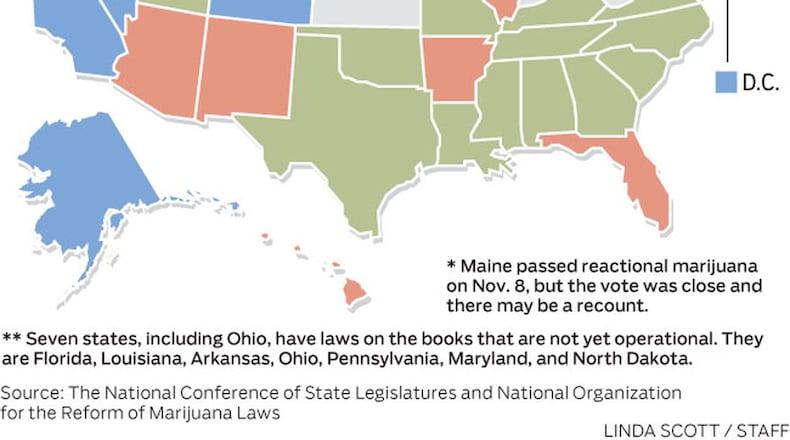Seidel said Trump, who campaigned as a law-and-order candidate, may signal his approach to drug policy based on who he appoints as U.S. Attorney General, Drug Enforcement Agency administrator and head of the Office of National Drug Control Policy.
The Trump transition team did not respond to requests for an interview.
The Marijuana Policy Project, which advocates for legalization, gave Trump a C-plus when it comes to pot issues. In April 1990 at a luncheon sponsored by the Miami Herald, Trump blasted federal drug enforcement as a joke: “We’re losing badly the war on drugs. You have to legalize drugs to win that war. You have to take the profit away from these drug czars,” he was quoted saying.
Last year, Trump said on C-SPAN that he supports medical marijuana and he told the Washington Post that marijuana legalization should be a state decision.
Ohio Gov. John Kasich in June signed a medical marijuana bill into law. Regulators from the Ohio Pharmacy Board, State Medical Board and Department of Commerce are writing rules to govern the burgeoning industry.
On Nov. 8, voters four states — California, Maine, Massachusetts and Nevada — approved ballot issues that will allow for recreational adult-use of marijuana. (The vote in Maine is close enough that a recount is expected.)
The same day, three other states — Arkansas, Florida, and North Dakota — approved comprehensive medical marijuana programs and Montana voters approved an expansion of that state’s existing medical pot program. Arizona voters rejected a proposal to regulate marijuana like alcohol.
Marijuana Policy Project Executive Director Rob Kampia in a written statement called it “… the most momentous Election Day in history for the movement to end marijuana prohibition. From Los Angeles to Boston, voters are casting their ballots in favor of sensible marijuana policy reforms. Today’s results are right in line with national polls showing record-high support for making marijuana legal. These votes send a clear message to federal officials that it’s time to stop arresting and incarcerating marijuana users. Congress must take action to ease the tension between state and federal marijuana laws.”
Marijuana Business Daily, an industry publication, reported that eight more states will mean $7 billion to $8 billion in additional annual retail sales and puts 59.3 percent of the U.S. population in states that have legalized marijuana for either medical or recreational purposes. A Gallup survey released in October shows 60 percent of Americans support making marijuana legal.
In total, eight states will now permit adult-use of marijuana for medical and recreational purposes. Another 18 states have comprehensive medical marijuana laws, and more than a dozen have limited medical pot laws, according to the National Conference of State Legislatures.
And the weed map may grow. The Marijuana Policy Project says it aims to pursue legalization in another dozen states by 2019.
Ian James, who ran the unsuccessful ResponsibleOhio legalization campaign and is now an investor in medical marijuana enterprises, said the Trump administration likely won’t interfere with medical marijuana programs.
“I think Ohio is good to go,” he said. “His stance has been supportive of medical marijuana and of the states having the right to decide policy on compassionate care for the chronically and terminally ill.”
James predicts that Trump will adhere to his support for states’ rights in making key decisions, such as marijuana legalization.
“I can’t see him trampling on states’ rights,” James said. “That’s not a good look and not one I think he would take.”
About the Author

